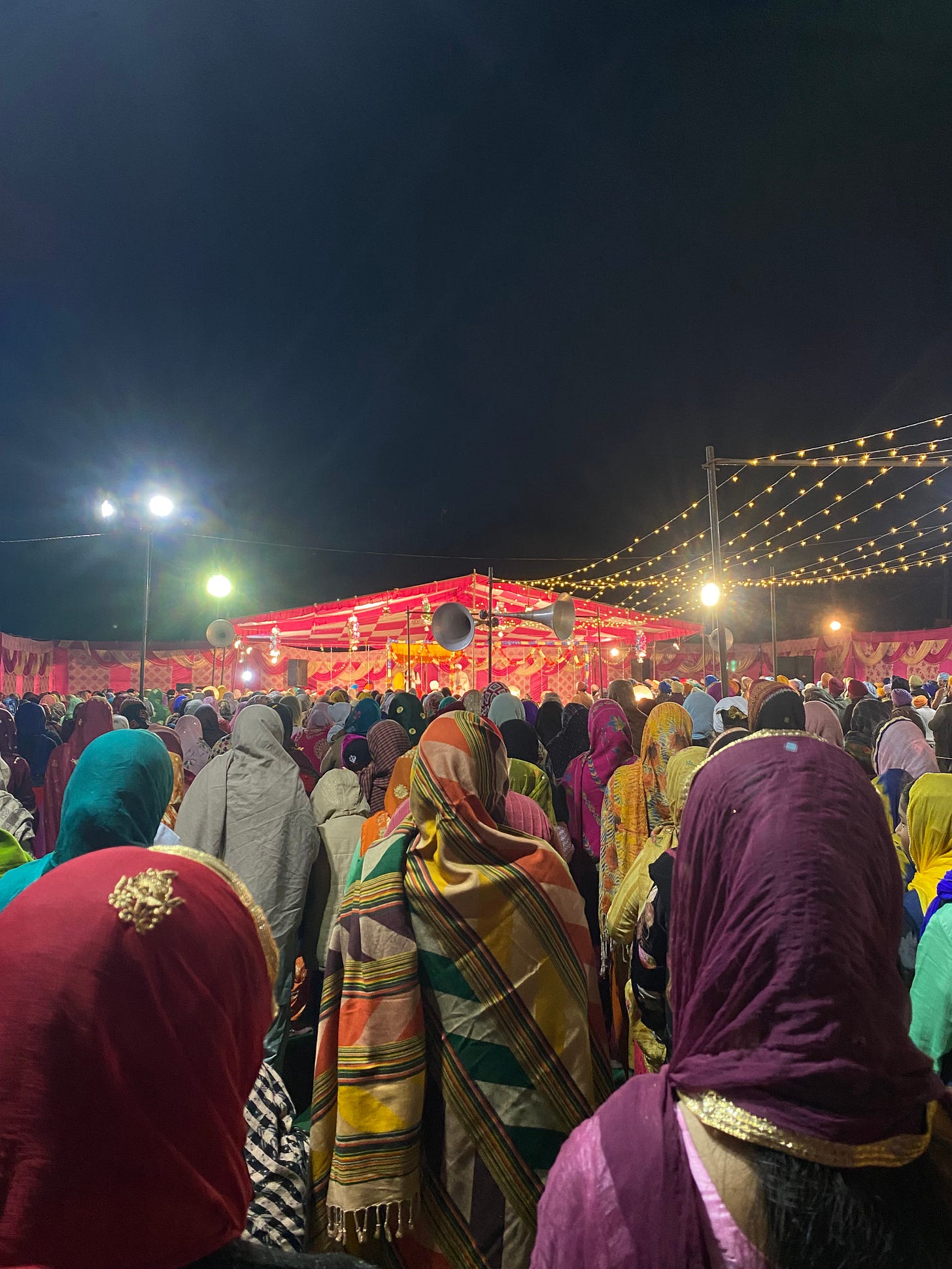I’m really grateful to the internet for how it allows me access to my loved ones and to ideas that shape my experiences and perspective. But my distaste for social media has grown exponentially, as has my distrust of the powers that create our algorithms. (On this topic, I loved this discussion from Democracy Now! on how “our public information ecosystem, social media, Facebook, is corrupting our individual communications with each other, taking away agency”). As such, I feel that it's critical to reclaim this agency— of course, primarily by pouring into our real life communities and what’s around us, but also by reorienting our online engagement.
Through this monthly newsletter, I hope to share media that I find enriching, and to practice my own skills in thinking, writing and creating. In 2024, I applied to law school, and I had a really tough time doing it. Taking (and retaking) the LSAT forced me to reevaluate my previous understanding of myself and my relationship to learning. And yet, what kept me afloat during this time was learning outside of the pursuit of university– the conversations and experiences I had with each of you are what continually imbued me with hope and inspiration to learn, love, and create. So after this particularly challenging year, I feel passionate about the myriad of ways not only in which knowledge should be pursued, but also how it should be applied. 2025 is about application!
You think your pain and your heartbreak are unprecedented in the history of the world, but then you read. It was books that taught me that the things that tormented me most were the very things that connected me with all the people who were alive, who had ever been alive.
-James Baldwin
Motif Mix: Absurdity
This seems to be the perfect word to encapsulate the feeling this January. Below are some works, new and old, that reminded me that absurdity is a universal and recurring (constant) phenomenon:
All We Imagine As Light | Film by Payal Kapadia, 2024
In November, I watched All We Imagine As Light with my friends at the Film Forum. In her review, Farah Cheded discusses one of the most poignant scenes of the film:
“You have to believe in the illusion, or you’ll go mad.” So says an anonymous speaker in Payal Kapadia’s glittering All We Imagine As Light. The film opens on documentary footage of Mumbai’s hustle and bustle, accompanied by voiceovers from real people who moved to the metropolis seeking work. With more than a touch of melancholy in their voices, they reflect on the city’s beguiling, disorienting effect — in their words, Mumbai is “the city of illusions,” where survival depends on how much you buy into the mirage.
When one is so beat down by poverty, by grief, by emotion, or just by the exhaustion of survival, what option do they have but to convince themselves that, in fact, their suffering or their labor is worth something? Without belief in this illusion, and with interrogation into the systems responsible for this despair, madness is sure to follow. Each morning when I watch troves of people load and unload onto the underground train, somberly waiting to reach the destination of their employment, I think of how we have no option but to believe that our pursuit of gaining capital must be worth the sunshine we sacrifice.
Conversation with the Supplicant | Short story by Franz Kafka, 1971
In Kafka’s short story, Conversation with the Supplicant, the narrator attends church every day, until one day he notices that a young supplicant has thrown himself on the floor, and is writhing and sighing loudly. Perturbed by his disruption of the church, the narrator confronts the supplicant. The supplicant responds that the aim of his life is to get people to look at him. He tells the narrator that, rather than feeling ashamed about his “socially unacceptable” behavior, he should rather complain about the socially unacceptable society he resides in.
“What dreadful days I have to live through! Why are all our buildings so badly put together that tall houses sometimes collapse without any discernible external cause? I go clambering over the ruins asking everyone I meet: ‘Now how could such a thing happen! In our town– a brand new house– that’s the fifth one today– just think of it.’ And nobody can give me an answer. And people often fall down in the street and lie there dead. Then all the tradesmen open their doors that are hung with a litter of goods, come trotting out, carry the dead man into a house, and then appear again, with smiling eyes and lips, saying: ‘Good morning– the sky is overcast– I’m selling a lot of kerchiefs– yes, the war.’”
It is unacceptable to writhe and grieve and disrupt in public. And yet, death and destruction are a normal and expected reality. They are reduced to nothing but a small portion of a sentence that consists of greeting small talk. The tradesmen come trotting back out after carrying the dead men into a house, smiling again– not unlike every American politician this last year (and prior). For some reason, the supplicant, the disruptor is the absurd one. Not the conditions that have compelled him to writhe and sob.
I Know Why the Caged Bird Sings | Novel by Maya Angelou, 1969
I Know Why the Caged Bird Sings is Maya Angelou’s autobiography, recounting her life from age 3 to 16. In the below excerpt from the novel, she describes her experience at the annual prayer revival meeting in Stamps, Arkansas during the Jim Crow South. People from all the neighboring Black churches attend, and the prayer is held in a modest tent outside, rather than the usual church.
“...the idea of praising God in a tent was confusing, to say the least. It seemed somehow blasphemous. The lights hanging slack overhead, the soft ground underneath and the canvas wall that faintly blew in and out, like cheeks puffed with air, made for the feeling of a country fair. The nudging and jerks and winks of the bigger children surely didn’t belong in a church. But the tension of the elders– their expectation, which weighted like a thick blanket over the crowd– was the most perplexing of all.
Would the gentle Jesus care to enter into that transitory setting? The altar wobbled and threatened to overturn and the collection table sat at a rakish angle. One leg had yielded itself to the loose dirt. Would God the Father allow His only Son to mix with this crowd of cotton pickers and maids, washerwomen and handymen? I knew He sent His spirit on Sundays to the church, but after all, that was a church and the people had had all day Saturday to shuffle off the cloak of work and the skin of despair.”
With certain absurdities comes optimism. The children nudge and jerk in excitement for the arrival of gentle Jesus, whereas the elders are tense. Because children can not comprehend the supposed absurdity of God in a tent– they are joyful, and even expectant of this occurrence. But because the elders have been hardened by life, and thus “the illusion”, they are having difficulty indulging in their hope that Jesus will in fact arrive. And yet, He does.
The above photo is from a night of tent prayer I attended at my ancestral village in Lalton Khurd, Punjab. The sangat prayed underneath the pink drapes, and then together we sat in the dirt and ate langar. Just as God mixed with cotton pickers and maids, washerwomen and handymen, so too does God not hesitate to mix with the poor, the Dalits, or the Lalton villagers beat by poverty and struggle.
Miscellaneous Mix
“And I think it’s wrong to think of this as a pandering to Trump or getting down on his knee to Trump. It’s actually just the opposite. In the United States, the government is subservient to corporations, especially this corporation. Zuckerberg always gets what he wants out of the United States government. He sees an opportunity to get even more of what he wants out of the Trump administration, because what he wants is to be able to threaten and win in a power struggle against Lula in Brazil, who has put forth very strong regulations against all social media companies. So, Zuckerberg absolutely cares more about Brazil than he does the United States. Brazil is still one of the most fervent and potentially important growth markets for Meta. He’s extremely concerned that the United States be able to use its power to limit regulation in Europe, as well. So what he’s hoping is Trump’s irascible, off-the-hook, unpredictable foreign policy, throwing sticks around the world, might help limit Europe’s willingness to regulate Facebook and Brazil’s willingness to regulate Facebook. This is all about opportunity, not subservience. He is hoping that once again the U.S. government is subservient to Facebook.”
How are Quebecois generally received in France, language-wise? - Rick Steves Travel Forum
During my visit to Montreal this month, I conversed with our new local friend Patrick about the difference between Quebecois French and France French. In many ways, it seems that the reception of Quebecois French in France mirrors the reception of Punjabi in India and Pakistan. Both languages are considered too rural, informal, and casual in many contexts. I’ll dive deeper into the reception of the Punjabi language post-partition in a future newsletter.
Ask a D.C. Native: Who do you consider a D.C. native?
“If you're a kid or a teenager riding these buses, you have observations. You see people and you see life that really shapes your perspective. I mean, you're 14 years old and you're seeing people, who now we know may have mental health issues, carrying on and having a really colorful conversation and cursing people out … they're having a fight or they're making out. They're playing cards. A lot of shit went down on the bus, and you’re taking it all in … that's giving you an education before you even got to school.”
Homage to the Square: Saturation
“In each of the over one thousand works that comprise the series, Albers used a single geometric shape to explore the range of perceptual effects that could be achieved solely through color.”
In closing, I must acknowledge you, the reader. Nearly all of these ideas have been introduced or enriched by the people in my life. So thank you to my #subscribers… I promise to never reduce you to just a number.
The form of this newsletter will likely be iterative, but I’m focusing on content for now. Please shoot me a text, audio message, or call with any of your thoughts on the form or content of Mehnaz Media Mix.
Love,
ਮਹਿਨਾਜ਼







So excited for what’s to come 🤍 you rock
This writing is the fountain catching your unyielding well of learning but mostly and importantly a pleasure to have in my hand